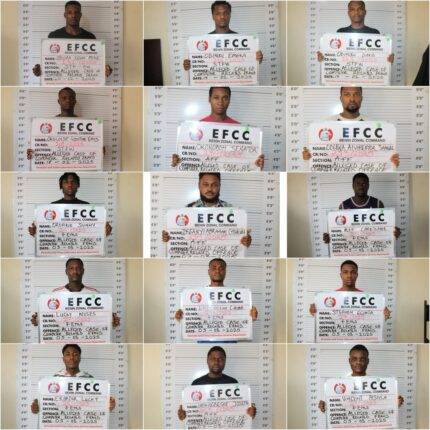Economic and Financial Crimes Commission (EFCC) has secured the conviction and sentencing of 29 internet fraudsters in Benin City, Edo State. The verdicts were delivered by Justices A.N. Erhabor and W.I. Aziegbemhin of the Edo State High Courts, who sentenced the convicts to various jail terms or fines.
The convicts, including Edeyibo Rukewe Hope, Igbafe David, Emakhu Bonfrey, Genesis Ndujifor, and Okolosie Godstime, were found guilty of various offences, including obtaining by false pretence, advance fee fraud, retention of proceeds of crime, and possession of fraudulent documents. Their prosecution was initiated by the EFCC’s Benin Zonal Directorate following a meticulous investigation and sting operations.
Legal Proceedings and Sentencing
During court proceedings, the defendants pleaded guilty to their respective charges, prompting the prosecution team—comprising F.A. Jirbo, K.Y. Bello, Isa K. Agwai, Faisal Ibrahim, Al-Amin Ibrahim Abdul, Bala-Ribah, and Salihu Ahmed—to urge the court to convict and sentence them accordingly. Defense counsel, however, pleaded for leniency, citing their clients’ remorse and willingness to reform.
Justice Erhabor sentenced 17 of the convicts, including Hope, David, Bonfrey, Emmanuel, Akahomhen, and others, to two years imprisonment each or a fine of N200,000. Justice Aziegbemhin imposed similar sentences on some defendants while increasing fines for others, such as Kelvin, Eghosa, Aivihenyor, and Ekhator, to N400,000 each. The court’s rulings underscored the judiciary’s resolve to curb internet-related crimes in the country.
Forfeiture of Crime Proceeds to the Federal Government
In addition to their sentences, the convicts were ordered to forfeit all assets obtained through fraudulent means to the Federal Government of Nigeria. Among the confiscated items was a red Mercedes Benz C300 with registration number BEN258CM, recovered from Odiniru Emeka Vet, which was deemed a proceed of crime.
Furthermore, electronic devices, including mobile phones and computers used in committing the offences, were seized by the authorities. The courts mandated that all convicts sign undertakings to be of good behavior moving forward, reinforcing the EFCC’s commitment to deterrence and rehabilitation.
How the Fraudsters Were Caught
The convicts’ downfall began with a coordinated sting operation by the EFCC’s Benin Zonal Directorate. Acting on credible intelligence, EFCC operatives tracked the suspects’ fraudulent activities, leading to their arrests. The investigation revealed that the fraudsters specialized in online scams, defrauding unsuspecting victims through impersonation and deceitful online schemes.
The EFCC’s proactive approach, including cyber-monitoring and intelligence gathering, played a crucial role in dismantling the fraudulent network. The agency reiterated its dedication to hunting down internet fraudsters and ensuring they face justice, serving as a warning to others engaging in similar crimes.
EFCC’s Stand Against Cybercrime
The EFCC has consistently intensified its efforts to combat cyber fraud in Nigeria. The successful prosecution of these 29 individuals is part of a broader crackdown aimed at eradicating internet scams, which have tarnished the country’s reputation globally.
The commission urged young Nigerians to pursue legitimate means of livelihood rather than engage in fraudulent activities. It also called on the public to remain vigilant and report suspicious financial transactions to relevant authorities. With this latest conviction, the EFCC reaffirmed its commitment to ensuring that fraudsters are brought to justice and that the proceeds of their crimes are recovered for the benefit of the nation.
Table of Contents
Discover more from OGM News NG
Subscribe to get the latest posts sent to your email.














